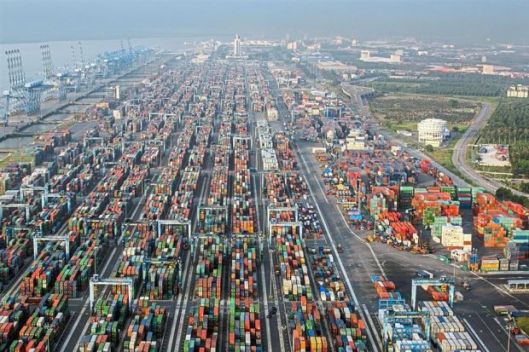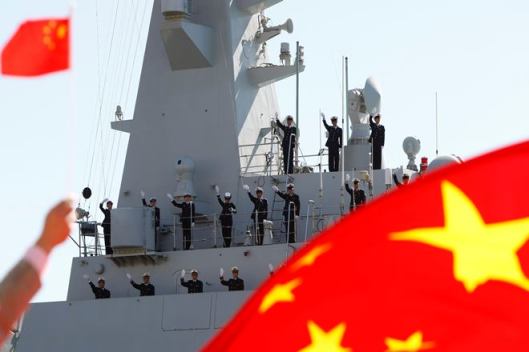In an effort to blunt growing concerns over China’s increasing footprint in Malaysia, an argument is being made that China is no different from any other country and should therefore be viewed and treated no differently.
Those who make this argument insist that there is no difference, for example, between investments from China and investments from other countries. They also wonder out loud why there are no corresponding concerns about sovereignty and related issues when other nations invest in Malaysia or when other foreigners take up residence under the Malaysia My Second Home programme (MM2H).
Is China no different from any other country?
Whatever the merits or otherwise of closer economic and political ties with China, one thing is clear enough: by almost any reckoning China is unlike any other country we deal with. Indeed, China poses a unique set of challenges that sets it apart from other countries.
The big-power reality
In the first place, China is the region’s predominant power.
History teaches us that big powers invariably seek to establish spheres of influence and exert hegemonic control over their neighbours.
Both the United States and the former Soviet Union did so in Latin America and Eastern Europe respectively. Supportive governments were maintained; recalcitrant ones were replaced. As well, a framework of political, economic and military ties was constructed to bind the respective regions to the local hegemon.
All China’s economic, diplomatic and military interactions thus far suggest that China is following a similar pattern vis-à-vis Southeast Asia.
The One Belt, One Road (OBOR) strategy, for example, is not simply a regional development strategy; it is primarily a geopolitical construct designed to help China secure a dominant position in the region, binding Southeast Asia to itself in a web of economic and other ties. Once fully in place, countries like Malaysia will be inextricably and inexorably jointed at the hip to China.
China’s moves to neutralize ASEAN’s ability to act independently of China, its heavy-handed response to the Philippines over the Hague ruling, its aggressive intrusions into disputed waters, its growing influence in the domestic affairs of its neighbours, its steady military build-up in the South China Sea, etc., also suggest the pursuit of a wider regional agenda typical of big powers.
Tun Razak himself, the architect of our relations with China, recognized these dangers and went to extraordinary lengths to help construct a framework – ASEAN, the Zone of Peace, Freedom and Neutrality, the Southeast Asia Nuclear Free Zone, the Five Power Defence Arrangement, and a loose defence arrangement with the United States – to mitigate whatever ambitions China might have.
Even the inclusion of Vietnam, Cambodia, Laos and Myanmar in ASEAN was predicated upon a similar calculus.
It was a sensible, common sense approach given China’s proximity, power and ambitions.
Non-interference
China also poses unique challenges to the integrity of our domestic political process.
Recognizing the potential for interference in our domestic affairs, and the dangers to both national security and national unity, Tun Razak also insisted on strict respect for the principle of non-interference and put in place what was in effect an internal firewall to keep China out of our domestic affairs.
In order to curry favour with China and keep open the spigot of investments, loans and deals, the firewall has now been progressively compromised with predictable consequences.
Despite its oft-repeated commitment to the principle of non-interference, the Chinese embassy increasingly thinks nothing of warning opposition leaders who question the direction of Malaysia-China relations or favouring certain political parties by its high-profile attendance at conferences and political events. It is even attempting to position itself as one of the principal interlocutors of the Malaysian Chinese community.
There are also indications that it may be co-opting local groups to do its bidding in classic united front fashion.
Just last week, for example, a local trade association lodged a police report against a planned march by the Falun Xiulian Dafa Association, a legally registered body in Malaysia which Beijing violently opposes.
Interestingly, among the reasons given was that Falun Gong is banned in China and that the march might adversely affect Malaysia-China relations. All local Chinese associations were also urged to unite against the planned Falun Gong march and lodge police reports against them.
Even some of our political parties are now behaving more like extensions of the PRC embassy – setting up PRC affairs committees and OBOR centres – than as Malaysian political parties.
Needless to say, the more China has to lose, the more it will be tempted to involve itself in domestic affairs.
Indeed, the recent embassy statement that it would “not allow anyone to jeopardize… bilateral cooperation” can be taken as a warning that it will intervene where necessary to protect its interests. Furthermore, the billions of ringgit in infrastructure projects, business and trade deals that China brings to the table gives it unparalleled domestic leverage to influence and affect outcomes.
The ethnic factor and large-scale development projects
There is also no point pretending that ethnicity as well as the potential numbers involved have no bearing on large-scale development projects like Forest City and Bandar Malaysia now being built by China-based companies and marketed almost exclusively to PRC nationals.
Given China’s population size, everything about China is huge – 10,000 students now studying in Malaysia, 4 million tourists expected this year. It is therefore not inconceivable that we’ll soon be playing host to hundreds of thousands of PRC residents when these cities are completed.
By contrast, between 2002 and mid-2016, only 30,194 foreign nationals from a number of different countries were approved to reside in Malaysia (MM2H official portal) and they were spread out across the country.
What are the national security implications of having large PRC enclaves in Malaysia? How far will China go to protect the investments, interests and security of its nationals in Malaysia?
Furthermore, will large concentrations of PRC nationals be accepted by the UMNO-PAS base itself given that Malaysia’s own ethnic Chinese have been consistently demonized and cast as an existential threat to Malay power, religion and culture? Will there be a pushback sooner or later? How will it affect Malaysia’s already frayed ethnic relations?
And how would our dysfunctional immigration system manage the influx of hundreds of thousands of additional temporary residents when it has done such an abysmal job of controlling our borders thus far?
While those with vested interests tend to play down these issues, the concerns are real enough.
If projects like Forest City are truly in the national interests, the authorities should lay before the nation the facts of the matter – what are the benefits, how many PRC nationals are expected to reside in these developments, what their status would be, what steps would be taken to ensure these development projects are fully integrated into local society, whether all relevant laws and regulations would be complied with – and build at least a general consensus to avoid adverse reactions later on.
PRC business culture
China also stands apart by the business practices of its corporations and their adherence to state policies that prioritise China’s economic and strategic interests.
Many of the big PRC infrastructure and township development projects, for example, invariably include design, procurement, construction and management services. Almost everything involved – technology, equipment, construction materials, even manpower – is sourced from China and benefit China-based corporations and workers. Even the working language at construction sites is Mandarin.
How do such business practices benefit the local economy? Will local companies be marginalized? How many and what kinds of jobs are really being created for Malaysians? Do these projects truly benefit the nation or just a few well-connected cronies? Are powerful Chinese corporations exempt from rules and regulations concerning transfer of technology, employment of locals, local sourcing of materials, etc., that were standard for other foreign companies?
It is instructive that African countries which were the beneficiaries of large Chinese projects are now complaining about some of these issues.
And then there is the issue of corruption.
Transparency International’s 2011 Bribe Payer Index ranks Chinese companies second out of a list of 28 countries in terms of their willingness to pay bribes. Malaysia, for its part, is now one of the most corrupt countries in the world. When two corrupt systems interact on projects that are worth billions, can there be any doubt that billions will be diverted into private coffers or used to further subvert what’s left of our democracy?
FDI or soft loans?
It should also be noted that many of the big Chinese projects like the East Coast Railway are actually being financed through soft loans rather then foreign direct investments. Given the massive amounts involved – all coming from a single country, much of it from the state itself – the government of China could soon emerge as one of our largest creditors.
In countries like Pakistan and Sri Lanka, indebtedness to China has brought with it ruinous consequences – pressure to sell local stakes in Chinese-financed projects, 99-year leases on ports and other high-value assets, special market access and rights to additional projects on preferential terms. Some would argue that there is, in fact, a pattern of predatory lending where debt is used to ensnare small countries.
It ought to be of concern to those countries borrowing heavily from China.
Critical infrastructure
China is unique as well in its strategic focus on critical sectors of the economy. No other country, for example, is simultaneously involved in as many port projects in Malaysia – Kuala Kedah Port, Penang Port, Port Klang (Carey Island), Kuala Linggi Port, Malacca Port, Kuantan Port, Samalaju Port – and in almost every single new railway project in the country.
By contrast, other major investments and contracts involved a number of different private non-state corporations from different countries spread out over a number of different sectors.
What are the national security implications of allowing a single country, particularly one with geopolitical ambitions, to dominate our transportation infrastructure?
Interestingly, other countries are far more cautious when it comes to foreign corporations acquiring control of critical infrastructure. Australia, for example, has just set up a ‘Critical Infrastructure Centre’ to oversee key assets and assess whether foreign-led bids for key assets including power grids and ports pose any national security risks.
South China Sea
And finally, China is also the only country in the region that is aggressively challenging Malaysia’s sovereignty and territorial integrity. Chinese naval and coastguard units regularly and persistently intrude into our waters and harass our fishermen in pursuit of their claims to reefs, shoals and islands in the South China Sea that belong to Malaysia.
Whether we care to admit it or not, we have a growing national security crisis in the South China Sea on our hands and no coherent strategy in place to deal with it. While no one wants to see the issue escalate, it does not help that we look to the very country that challenges our sovereignty to defend it or cosy up to the very navy that intrudes into our waters and harasses our fishermen.
Too important to treat as just any other nation
For all these reasons, China is unlike any other nation we are engaged with.
While China is too big, too important to ignore or treat with hostility, it is also too important not to be managed with prudence and realism or pursued without adequate strategic focus.
We must not be so mesmerized by the opportunities that we overlook the dangers, so narrowly focused on tantalizing projects and lucrative deals that we miss the wood for the trees, so intent on private agendas and personal gain that we lose sight of national interests.
China is different, very different, from all the other countries we are engaged with; to pretend otherwise would be both foolish and naïve.



















